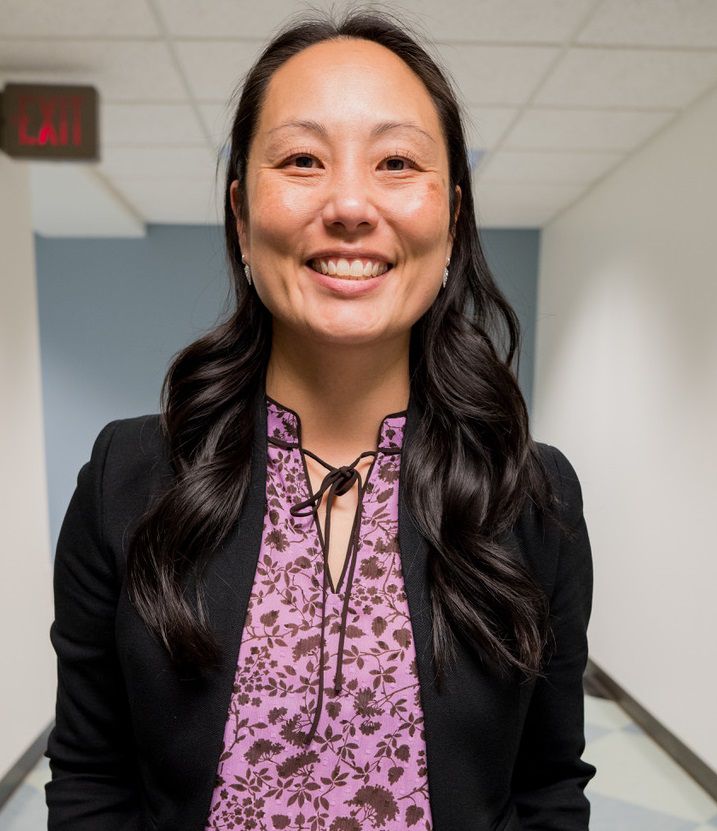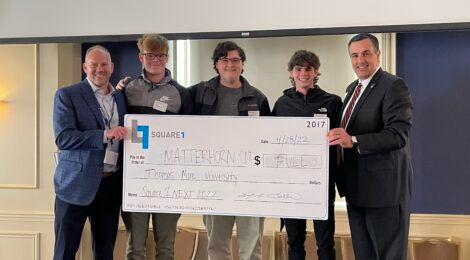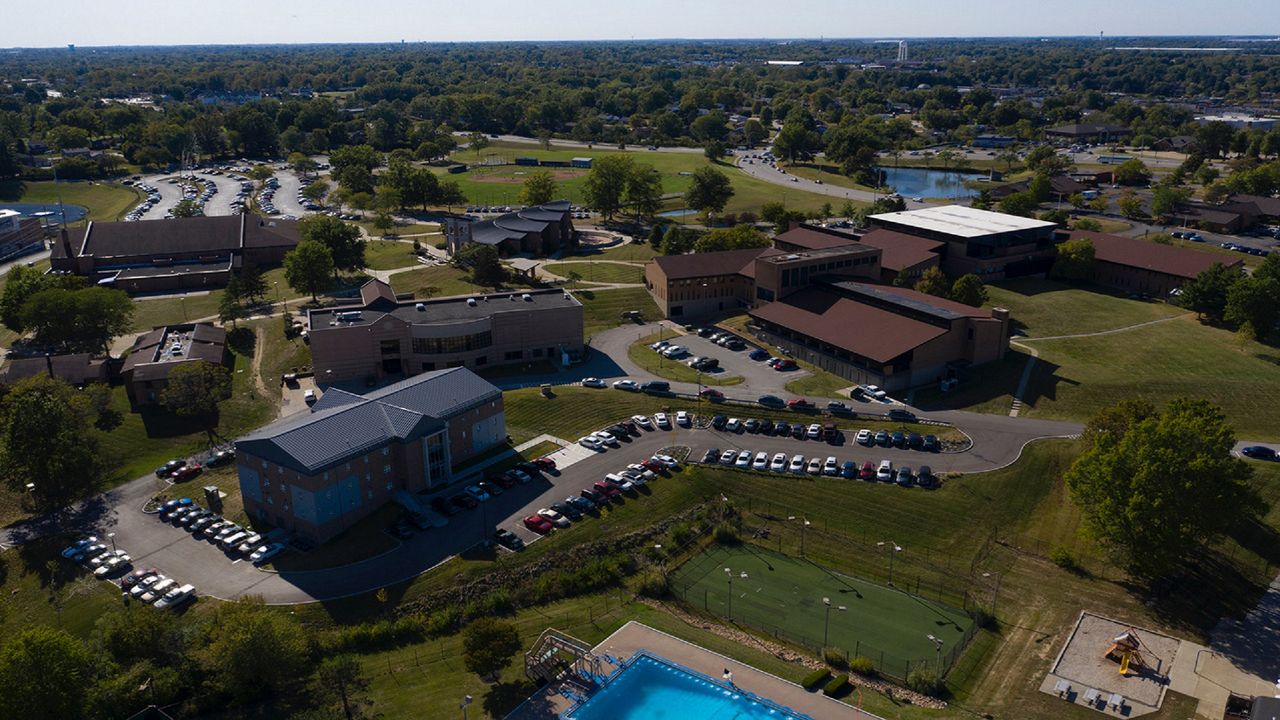CRESTVIEW HILLS, Ky. — Jeni Al Bahrani used the training she received at Thomas More University to create several small businesses in the greater Cincinnati area.
Now, 17 years after graduating, the 44-year-old is returning to the school’s Northern Kentucky campus to support the next generation of entrepreneurs and innovators.
What You Need To Know
- Thomas More University is starting a new student center focused on leadership, entrepreneurship and innovation
- Jeni Al Bahrani, a graduate of Thomas More, is coming back to the Northern Kentucky campus to create the program
- One of the first initiatives of the Zembrodt Center is a "Shark Tank"-like competition for students this spring
- University leaders view the center as a key part of its strategic redevelopment
Thomas More, a small Catholic university, announced late last month that it tapped Al Bahrani to serve as the first director of the new Dr. Anthony ‘65 and Geraldine ‘66 Zembrodt Center for Leadership, Entrepreneurship, and Innovation.
Prior to returning to the Crescent Hills campus, Al Bahrani developed the Center for Entrepreneurship at Transylvania University in Lexington, Ky.
“It’s definitely a perfect match,” said Al Bahrani, who graduated from Thomas More in 2005 with a degree in business management and administration. “After learning about the center, I knew I had to apply. Really, it’s an honor to come back to my alma mater.”
‘A lifelong entrepreneur’
Al Bahrani described herself as a lifelong entrepreneur, dating back to her days growing up on Cincinnati’s West Side. As a teen, she worked alongside her father in his office supply store in Cheviot.
During her career, Al Bahrani has started several businesses, including a wellness brand and real estate investment company. She also helped fellow entrepreneurs find commercial real estate in Cincinnati and Northern Kentucky.

She decided to shutter those businesses in 2020 to move to Europe with her husband. She used her time abroad to earn a graduate degree in entrepreneurship from Trinity College in Dublin, Ireland.
“What I really wanted to do was learn to approach entrepreneurship from a global level. My goal was to bring back that education and experience to impart that knowledge to future entrepreneurs,” Al Bahrani said.
After finishing her degree, she came back to Kentucky and started a boutique consulting and investment agency focused on ideation development and economic planning.
She considers it helping budding business owners turn their “happy hour napkin big ideas” into workable business models.
Al Bahrani made the decision last year to use her knowledge to help students on a broader scale when Transylvania recruited her to build out its Center for Entrepreneurship. That involved coming up with programming and creating community resources, including connections with regional corporations and other parents who could help create opportunities for students.
Her experiences in Lexington are part of the reason Bruce Rosenthal, dean of Thomas More’s College of Business, felt she was the right person to direct the Zembrodt Center. Her connection to the university and familiarity with the region were bonuses, he said.
“Mrs. Al Bahrani brings a wealth of experience in creating entrepreneurial programs, as well as drive, determination, and an understanding of the importance of the entrepreneurial mindset to all aspiring leaders and businesspeople,” Rosenthal said.
Generating a buzz in Northern Kentucky and beyond
Rosenthal, who came to Thomas More in May 2021, believes the new program sends a signal to students, prospective students and the community at large that the university is “on the move.”
“We want students to be inspired,” he added. “We may not compete head-to-head with some of the bigger universities, but we’re showing that we’re a strong, viable choice for students who are interested in a well-rounded education.”
Rosenthal stressed that while the center has a business-leaning focus, The Zembrodt Center will be available to all students regardless of their major.
He envisions students in fields like English, art, physics and economics working side-by-side in cross-disciplinary teams. Those unique perspectives, he feels, will lead to some of “innovative ideas for addressing unique problems.”
Al Bahrani supports that vision for the center. She feels the entrepreneurial, leadership and critical thinking skills are universally transferable, regardless of a person’s desired career or whether they want “start a business or work for someone else’s.”
“Employers and investors want problem solvers and innovators who view the world through an entrepreneurial lens,” she added. “Anyone can create a business or a product. We want to help our students approach things more holistically.”

Al Bahrani doesn’t officially start until January, but she’s spending the next few weeks connecting with students, alumni, faculty, staff and the community to familiarize herself with the much-changed school.
She compares creating the program to starting a business.
“No matter what you’re building, it will benefit from doing so through an entrepreneurial process,” Al Bahrani said. “That means asking questions about the problem you’re trying to solve, brainstorming about potential solutions and getting feedback from the community about how it would benefit them most.”
Al Bahrani will also work with university leadership to author a strategic plan to outline specific programmatic elements such as courses, certifications, lectures and special events.
One thing that’s already in place, though, is a semester-long, “Shark Tank”-like competition that will allow students to pitch innovations and ideas to at least 10 local corporations. Those companies have agreed to award cash prizes to the winners as a form of seed money for funding their endeavors, Rosenthal said.
The university hasn’t yet released details about how the program will work, but it will begin next semester, Al Bahrani said. The competition is set for the spring.
“The competition is embedded into a class on purpose, so students can take what they’re learning in class, gain these entrepreneurial leadership skills, and use them to potentially bring an idea to life,” she added.
Colin Wilmhoff, a freshman law major, voiced excitement about the program. He earned a full-ride to Thomas More through the school’s Square1 pitch competition. The Beechwood High School grad pitched a single person tent design.
“Even if people prefer the humanities over business or whatever, everyone has ideas. They may not have the drive or the funding to pursue it as a business though, so this might be a good push for them to actually try to pursue it,” he said.
‘Lighting the Way’ for a new Thomas More University
As part of the university’s five-year strategic plan, “Lighting the Way,” Thomas More is building a new multimillion-dollar academic center and enhanced student spaces.
Besides the Zembrodt Center, the 34,000 square foot space will feature a 375-seat auditorium, a technology and prototype lab, classroom space, a four-story atrium and several breakaway areas for meetings or events.
President Joseph L. Chillo referred to the Zembrodt Center as evidence that Thomas More is becoming an innovation destination for “young entrepreneurs looking for resources to develop their ideas in an academic environment.”

He noted Al Bahrani’s “wealth of knowledge and expertise” as key to supporting and growing these initiatives both on campus and across the region.
Construction is set to move forward this summer. Once complete, the building will house both the Zembrodt Center and the College of Business. It will also house the university’s Center for Faith, Mission, and Catholic Education.
The decision to combine spaces for the faith and business centers was intentional, Rosenthal said. And that’s aligning with the university’s mission to create “good, ethical people who want to serve humanity and help heal the Earth.”
He commented that the goal is to show the different approach Thomas More hopes to take regarding business and entrepreneurship.
In the selection of a director of the program, Anthony and Geraldine Zembrodt emphasized the need for the center bearing their name to work toward creating innovations that challenge the status quo.
Themes such as sustainability, environmental innovations and social benefits will all be key themes within the Zembrodt Center and Thomas More’s general business courses, Rosenthal said. He hopes students will look to create businesses and projects that look to “benefit the community, not take from it.”
“If society is going to change, it’s probably not going to be governments that do it,” he added. “We know the potential power of the entrepreneurial spirit and we look forward to working with Jeni to help harness that power."





